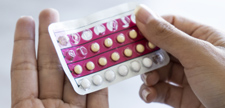
HIV is criminalized when people who are HIV positive can face criminal charges for engaging in acts not considered criminal if done by a person who is HIV negative.

If you’ve ever had acne, you’ll know that there are a million things that can cause it, and another million things that are supposed to get rid of it…including birth control. Birth control pills are well known for improving acne, but what about other types of hormonal birth control? How does the IUD stack up? In the past, it has been accepted that IUDs only deliver hormones to the uterus, and that the level of hormones was too small to make it through the bloodstream to other places in the body. Studies are now suggesting that it is possible that hormones in the IUD can and do worsen acne.

If you have been watching a streaming service with ads in recent months, then there is a good chance an ad has popped up with Annie Murphy (Alexis Rose from Schitt’s Creek), promoting a new form of birth control approved on the market: Phexxi. Produced by Evofem Biosciences, Phexxi is a vaginal gel composed of lactic acid, citric acid, and potassium bitartrate. Approved last year, Phexxi is being marketed as a non-hormonal alternative to traditional hormonal oral contraceptives. It works by altering vaginal acidity directly before a sexual encounter to prevent sperm from being able to travel to and fertilize an egg.

Transmasculine people on testosterone may experience atrophic vaginitis. It is thought to be due to the suppressive effects of testosterone on estrogen, leading to an estrogen-deprived state that appears to be similar to the experience of many post-menopausal cis women. Atrophic vaginitis is a reflection of poor skin barrier function and low tissue resilience, and is associated with bacterial vaginosis (BV).

Intrauterine devices (IUDs) are an increasingly popular choice for contraception. There are two types: hormonal (which contain progestin, a form of progesterone) and non-hormonal, made with copper. You can discuss with your health care provider which one is best for you.

As a medical student on clinical rotations, I have witnessed many office gynecologic procedures such as pap smears, IUD insertions and even colposcopies and endometrial biopsies. With IUD insertion specifically, I am always surprised by the wide range of patient reactions to what the provider usually describes as “a small pinch.” Some people tolerate these procedures well while others are visibly tearful and in a lot of pain. IUDs are an extremely effective and reliable form of birth control, but it is possible the pain of insertion deters some from utilizing this method.

Birth control is an important decision that is often accompanied by many questions. There are several options available, each with risks and benefits. Thus, it is important to know all information in order to choose which method is best for you.

Vaginitis is defined by a combination of any of the following symptoms: abnormal vaginal discharge, abnormal odor, itching, burning and irritation. While this condition can cause embarrassment, it is very common, and most women have at least one episode in their lifetime. Vaginitis occurs due to an imbalance of healthy bacteria and change in vaginal environment because of age, sexual activity, hormonal status, immunologic status and underlying disease states. Vaginas commonly have normal physiologic discharge, which for most people is clear to white, not associated with discomfort or itching, and will vary in quantity throughout the menstrual cycle. “Normal” discharge varies from person to person.

Emergency contraception (EC) is used to prevent pregnancy before it happens after unprotected sex or at times when birth control fails during sex. It is different from the abortion pill, which is meant to terminate pregnancies after they have already occurred. There are a variety of reasons someone might need EC. Perhaps they forgot to take their birth control pill that day or place their vaginal ring. Maybe the condom broke during sex or their partner did not pull out in time.

Human papillomavirus (HPV) is the most prevalent sexually transmitted infection (STI) in the United States; approximately 14 million Americans become infected each year. Although HPV most often presents asymptomatically and clears without major clinical consequence, it can persist and progress to anogenital warts, precancers or even cancers of the cervix, other anogenital tract and oropharynx. In the United States, over 40,000 cancers are diagnosed each year in both men and women that are attributed to HPV infection. In women, HPV is thought to be linked to greater than 90% of cervical cancer cases and approximately 70% of vaginal and vulvar cancers.

Did you know that one in five college-aged women experience pain with sexual intercourse? In fact, nearly three out of four women have pain during intercourse at some point during their lives.1,2 Does this mean that its normal and should be tolerated? No.

Endometriosis is the presence of endometrial tissues outside the uterine cavity. This estrogen-dependent disease has its highest incidence in women aged 25-29 years and affects about 10% of reproductive-age women. In women with pelvic pain, 70-90% have endometriosis. Similarly, women who struggle with infertility are found to have endometriosis 21-40% of the time. Women are at a 6-fold increased risk of endometriosis if a first-degree relative is diagnosed with a severe form of the disease.